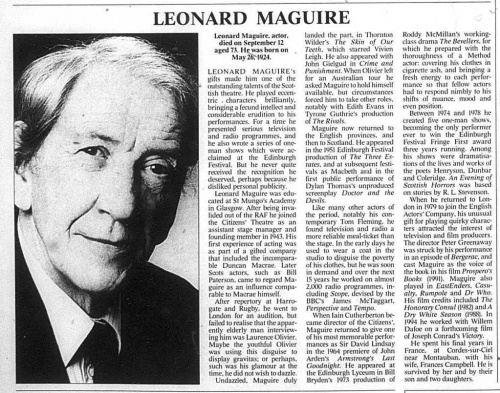Difference between revisions of "Leonard Maguire obituary (The Times)"
John Lavalie (talk | contribs) (Created page with "{{obit|Lenoard Maguire}}{{article | publication = The Times | file = 1997-09-29 Times.jpg | px = 500 | height = | width = | date = 1997-09-29 | author = | pages = 27 | lang...") |
John Lavalie (talk | contribs) |
||
| Line 1: | Line 1: | ||
| − | {{obit| | + | {{obit|Leonard Maguire}}{{article |
| publication = The Times | | publication = The Times | ||
| file = 1997-09-29 Times.jpg | | file = 1997-09-29 Times.jpg | ||
Latest revision as of 19:05, 1 October 2017
- Publication: The Times
- Date: 1997-09-29
- Author:
- Page: 27
- Language: English
Leonard Maguire, actor, died on September 12 aged 73. He was born on May 26, 1924.
LEONARD MAGUIRE's gifts made him one of the outstanding talents of the Scottish theatre. He played eccentric characters brilliantly, bringing a fecund intellect and considerable erudition to his performances. For a time he presented serious television and radio programmes, and he also wrote a series of one-man shows which were acclaimed at the Edinburgh Festival. But he never quite received the recognition he deserved, perhaps because he disliked personal publicity.
Leonard Maguire was educated at St Mungo's Academy in Glasgow. After being invalided out of the RAF he joined the Citizens' Theatre as an assistant stage manager and founding member in 1943. His first experience of acting was as part of a gifted company that included the incomparable Duncan Macrae. Later Scots actors, such as Bill Paterson, came to regard Maguire as an influence comparable to Macrae himself.
After repertory at Harrogate and Rugby, he went to London for an audition, but failed to realise that the apparently elderly man interviewing him was Laurence Olivier. Maybe the youthful Olivier was using this disguise to display gravitas; or perhaps, such was his glamour at the time, he did not wish to dazzle.
Undazzled, Maguire duly landed the part, in Thornton Wilder's The Skin of Our Teeth, which starred Vivien Leigh. He also appeared with John Gielgud in Crime and Punishment. When Olivier left for an Australian tour he asked Maguire to hold himself available, but circumstances forced him to take other roles, notably with Edith Evans in Tyrone Guthrie's production of The Rivals.
Maguire now returned to the English provinces, and then to Scotland. He appeared in the 1951 Edinburgh Festival production of The Three Estates, and at subsequent festivals as Macbeth and in the first public performance of Dylan Thomas's unproduced screenplay Doctor and the Devils.
Like many other actors of the period, notably his contemporary Tom Fleming, he found television and radio a more reliable meal-ticket than the stage. In the early days he used to wear a coat in the studio to disguise the poverty of his clothes, but he was soon in demand and over the next 15 years he worked on almost 2,000 radio programmes, including Scope, devised by the BBC's James McTaggart, Perspective and Tempo.
When Iain Cutherberton became director of the Citizens', Maguire returned to give one of his most memorable performances as Sir David Lindsay in the 1964 premiere of John Arden's Armstrong's Last Goodnight. He appeared at the Edinburgh Lyceum in Bill Bryden's 1973 production of Roddy McMillan's working-class drama The Bevellers, for which he prepared with the thoroughness of a Method actor: covering his clothes in cigarette ash, and bringing a fresh energy to each performance so that fellow actors had to respond nimbly to his shifts of nuance, mood and even position.
Between 1974 and 1978 he created five one-man shows, becoming the only performer ever to win the Edinburgh Festival Fringe First award three years running. Among his shows were dramatisations of the lives and works of the poets Henryson, Dunbar and Coleridge. An Evening of Scottish Horrors was based on stories by R. L. Stevenson.
When he returned to London in 1979 to join the English Actors' Company, his unusual gift for playing quirky characters attracted the interest of television and film producers. The director Peter Greenaway was struck by his performance in an episode of Bergerac, and cast Maguire as the voice of the book in his film Prospero's Books (1991). Maguire also played in EastEnders, Casualty, Rumpole and Dr Who. His film credits included The Honorary Consul (1982) and A Dry White Season (1988). In 1994 he worked with Willem Dafoe on a forthcoming film of Joseph Conrad's Victory.
He spent his final years in France, at Cordes-sur-Ciel near Montauban, with his wife, Frances Campbell. He is survived by her and by their son and two daughters.
Disclaimer: These citations are created on-the-fly using primitive parsing techniques. You should double-check all citations. Send feedback to whovian@cuttingsarchive.org
- APA 6th ed.: (1997-09-29). Leonard Maguire obituary (The Times). The Times p. 27.
- MLA 7th ed.: "Leonard Maguire obituary (The Times)." The Times [add city] 1997-09-29, 27. Print.
- Chicago 15th ed.: "Leonard Maguire obituary (The Times)." The Times, edition, sec., 1997-09-29
- Turabian: "Leonard Maguire obituary (The Times)." The Times, 1997-09-29, section, 27 edition.
- Wikipedia (this article): <ref>{{cite news| title=Leonard Maguire obituary (The Times) | url=http://cuttingsarchive.org/index.php/Leonard_Maguire_obituary_(The_Times) | work=The Times | pages=27 | date=1997-09-29 | via=Doctor Who Cuttings Archive | accessdate=7 February 2026 }}</ref>
- Wikipedia (this page): <ref>{{cite web | title=Leonard Maguire obituary (The Times) | url=http://cuttingsarchive.org/index.php/Leonard_Maguire_obituary_(The_Times) | work=Doctor Who Cuttings Archive | accessdate=7 February 2026}}</ref>
